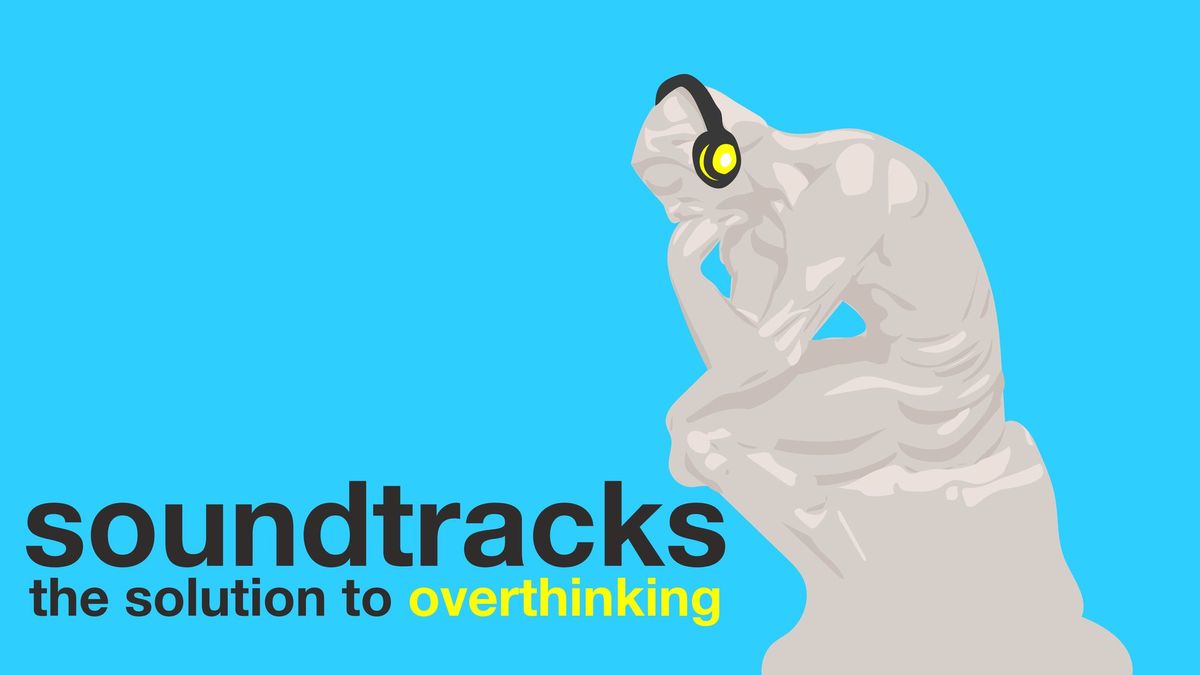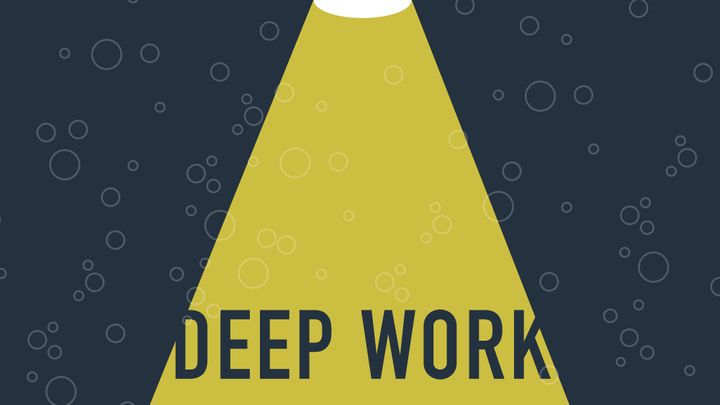Soundtracks by Jon Acuff: Book Summary
A summary of the book Soundtracks by Jon Acuff, in which the role of negative overthinking is discussed and a possible solution is introduced.

These are my permanent notes after reading the book Soundtracks by Jon Acuff. My goal is to summarize the book into my own words so that I can revisit and remember the important lessons. This is not a review—I try not to pass judgment and instead collect the things that resonate with me and preserve them.
Quick summary
Overthinking causes many of us to talk ourselves out of living the life we want by allowing our anxiety and doubt to discourage us. The self-talk we regularly tell ourselves is our “soundtrack”, and the content of that soundtrack can prime us to take or not take certain actions. By learning to turn down our negative soundtracks and replace them with positive ones we can turn our overthinking to our advantage. We can do this by collecting positive, resonant statements, creating a daily mantra from them, and then using that mantra to prime our thinking throughout the day.
Full summary
Overthinking can get in the way of living the life we want. Rather than acting, overthinkers get in their head about the various decisions they make throughout a day. This book attempts to overcome that tendency through the concept of “soundtracks.”
A soundtrack is the collection of thoughts we listen to on repeat. We listen to these thoughts so often that they prime us to act in certain ways.
Our soundtracks are negative.
Our brains are jerks. We dwell on embarrassing incidents from the past that we can’t change. We devote too much headspace to our insecurities. And we talk ourselves out of actions by listening to our fears and doubts about the future.
There are three main reasons our thoughts tend to skew negatively.
1. Our brain lies about its own memories.
Our memories are unreliable. As time goes on, we are much more likely to misremember events in our life, but our confidence about those memories only grows.
2. Our brain is particularly sensitive to trauma.
What’s the opposite of trauma? There is nothing equivalent because good events don’t register nearly as strong in our memories as negative events. When we experience social rejection—or even think about social rejection—our brains release opioids to help us survive emotional pain.
3. Our brain believes what it already believes.
We experience confirmation bias. If we tell ourselves we are disorganized, we’ll ignore five examples fo the contrary and latch onto the one example that proves that belief correct.
Because our brains naturally skew towards negative thought, we are liable to overthink our actions.
The results of overthinking
Overthinking tends to take one of the following forms in our lives.
- Imagining the worst possible outcomes
- Telling ourselves we are incapable
- Fearing what others will think of us
All of these things prevent us from taking actions we would like to take to improve our lives. We don’t take risks when we focus on the worst possible outcome. We don’t try things if we’re convinced we’d be bad at it. We don’t let our personality show when we fear being judged. In all cases, overthinking is the voice which says “no” when our hearts want to say “yes.”
We know that we’re going to regret the things we don’t do more than the things we did do, this adds up for an unfulfilling life paralyzed by fear.
In addition, all of this overthinking is a waste. Thinking burns energy. We’re wasting energy thinking about negative outcomes rather than new ideas. Learning not to overthink our actions can unleash a torrent of creative energy.
“If you can worry, you can wonder. If you can doubt, you can dominate. If you can spin, you can soar.”
We can choose our thoughts
The first thing to do is to take inventory of our thoughts. The thoughts we listen to over and over are our loudest soundtracks. Notice what we tell ourselves and write them down so that they can be analyzed.
For each thought, ask ourselves:
Is it true? Some thoughts sound ridiculous once we put them into words. An example from the book is “I can’t charge people for my services because there are better people than me.” This fails to stand up to scrutiny because by that logic only the greatest person in the world has the right to charge money.
Is it helpful? Thoughts that are based on things that happened in the past are almost never helpful. You had one bad experience with public speaking. That doesn’t mean you’ll never be good at it. It’s not helpful to keep telling yourself that you’re a bad speaker.
Is it kind? Psychological safety is important in a workplace, and it’s even more important in your own mind. I used to pride myself on some rather intense self-talk. I told myself I had no excuse not to excel because of my privileged upbringing. Sometimes this talk was helpful, it’s arguably true, but it certainly wasn’t kind.
Any thought that doesn’t receive three “yes”s from this test should be obliterated. But we can’t just stop thinking something. Negative thoughts are not a “switch” which can be flicked on or off. They are a “dial”. We can only turn their volume down.
In order to turn down negative soundtracks, we need to find techniques which help us to dwell on them less. Here the author suggested a number of techniques:
- Exercising
- Writing a list
- Completing a minor task to feel accomplishment
- Speaking to friends
The techniques that work in your own life will surely differ. For me, I tend to be able to reset my negative self-talk by listening to a playlist of power songs or playing with my cat.
Napster for positivity
Reducing the volume on our negative soundtracks opens up the opportunity to turn up the volume on a new, positive soundtrack.
Here, the author recommends simply listening for quotes that resonate with you and stealing them. These are very personal. Quotes that works for some people will sound banal or cheesy to another. That’s fine. You’re gathering these for yourself and no one else needs to hear them.
Some sources of new soundtracks...
Quotes from inspirational posters:
- “Be the change you want to see in the world.”
- “Shoot for the moon—even if you miss, you will land among the stars.”
- “Courage is being the only one who knows you’re afraid.”
Quotes from celebrities that resonate with you:
- “My life is dope and I do dope shit.” —Kanye West
- “I can’t think of any better representation of beauty than someone who is unafraid to be herself.” —Emma Stone
- “You’re only given a little spark of madness. You mustn’t lose it.” —Robin Williams
Here are some of the quotes that the author listed:
- “People are trying to give me money.” You have something to give the world and that people value.
- “It’ll feel awesome after.” It might hurt to start, but it will be worth it.
- “Spare change adds up.” If you said you’d write 1000 words today, write 1100.
- “Pick ROI, not EGO.” Do you want feedback or compliments? One will make you better, one will stunt your growth.
- “Pivot, don’t panic.” Life is trying to give you lessons. Learn to listen.
- “Writers write.” If you’re trying to write, get writing. Don’t worry about what you’ve published. Stay focused on the work.
If you want to write your own soundtracks, go right ahead. But there’s a wealth of inspiration out in the world already. Collect as much as you can and filter later.
Another way to find our new soundtracks is to study and flip our broken soundtracks. Take the thought you're already having and find a way to turn it positive. One negative soundtrack might be “I need to be finishing writing books.” You might agree with the sentiment but recognize that it’s not kind or helpful, and flip that to “Three pages a day is plenty.”
Or, you might catch yourself doubting yourself and saying “What if I fail?” Flip that to ask yourself “What if I’m a resounding success?”
The power of mantras
Zig Ziglar was a salesman and motivational speaker who was famous for advocating the daily affirmation. His advice: every morning when you wake up, and every night before you go to bed, look at yourself in the mirror and repeat a scripted mantra of positivity.
Ziglar’s mantra started like this:
“I, [your name here], am a person with integrity, a great attitude, and specific goals. I have a high energy level, am enthusiastic, and take pride in my appearance and what I do. I have a sense of humor, lots of faith, wisdom, and the vision and courage to use my talents effectively. I have character, and am a smart, talented person. My beliefs are strong, and I have a healthy self-image, a passion for what is right, and a solid hope for the future. I am an honest, sincere, and hard-working. I am tough, but fair and sensitive...”
You get the idea.
The author stresses that actually performing this action feels goofy and cringe, but that it’s an important step in opposing the tidal wave of negativity that usually floods our brains. You’re practicing having positive thoughts, not so you feel good in the moment you’re saying the mantra, but so that those thoughts can prime your mindset as you go through the day.
The book culminates with a personalized version of the mantra which synthesizes the most resonant of the positive quotes and individual insights the author collected. While the author’s own mantra (called The New Anthem) is tailored to his own desired mindset, it’s generalized enough to be of use to others. To prove this, he ran a study with 10,000 participants and saw that repeating the mantra had a positive effect on most people who tried it.
I am left thinking that the very act of saying a daily mantra can be effective, whether it's from Zig Ziglar or the author, but it’s important to ultimately compose your own mantra with the thoughts that you need the most in your life.
Positive thinking during the daily grind
For many of us, the moments immediately after we wake up and immediately before we fall asleep are some of the only moments we have true control over. Saying a mantra during these times has benefit, but what about the rest of your waking hours?
Two strategies are given for staying positive during the rest of the day:
- Gather evidence that things are good
- Create symbols to remind you of your ideals
Gather evidence that things are good
The author talks about a “pocket jury” which we carry around with us, constantly passing judgment on ourselves. In reality, this is just our brains’ natural inclination towards negativity. But rather than try to ignore this jury completely, we should try to gather real evidence to be used when arguing on our own behalf.
The daily mantra can prime our brain to recognize moments where the cheesy positive comments we make to ourselves are actually true. An act of real generosity will remind you of the comment you made to yourself that “I am a generous and good person.” Felt silly when saying it, but, huh, maybe it’s true?
One example the author gives is the quote “Everything is always working out for me.” We’re quick to notice when things don’t go our way, and to develop a victim’s mindset. But when we prime our minds with the thought that everything is always working out for us, those examples will start to become more obvious.
Create symbols to remind you of your ideals
A symbol is an object which holds particular meaning to a certain person. Rather than writing out quotes from your daily mantra near your workspace or in your car, you can encode those thoughts and intentions into a physical object.
For example, the author likes the symbol of a coin (in particular, a silver half-dollar). The coin looks like a dial, which reminds him that negative soundtracks can be turned down, and it can be flipped, which reminds him that negative soundtracks can be flipped.
What do you need to be reminded of during the day? What kind of physical symbol can you place in front of you on a daily basis? The book abounds with examples which work for certain individuals, but only you can decide what will work for you.

